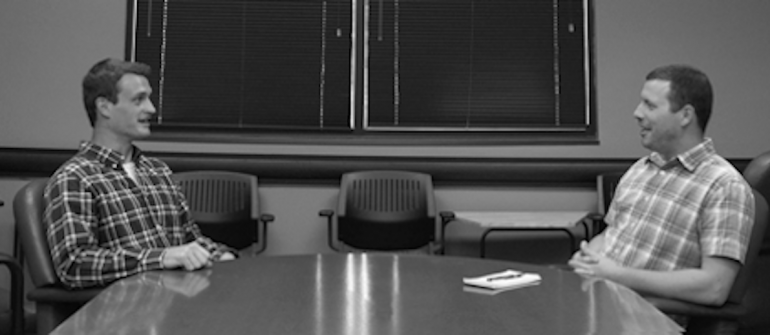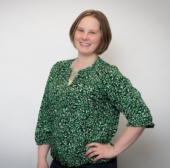By Betsy Barthelemy, Editorial Intern
From the Lessiter Link-Up column of the July 2019 Lessiter Link newsletter
Both with degrees in marketing and backgrounds in sales, Marketing Manager Dallas Ziebell and Inside Account Representative Kevin Reitz talk about how their similar pasts led them to different positions at LM.
Dallas Ziebell: How long have you been here now?
Kevin Reitz: I reached 2 years a couple of weeks ago. It's gone by quickly.
DZ: Did you come from a sales background?
KR: Yes. My first sales job was selling water coolers. The first half of every day, I would show up at businesses and ask if they wanted coolers. Typically, people would bring their own plastic water bottles, so I would explain to them how much more cost-effective our product was. I would go to residential areas and knock on people's doors. I liked it more than I thought I would. Door-to-door sales doesn't sound like much fun, but it actually is when you become successful at it.
Dallas Ziebell
- Job Title: Marketing Manager
- Years of Experience: 11
- Revealed Fact: Met his wife, Sam, while doing door-to-door lawn care sales.
DZ: I did residential door-to-door sales, too. I worked in lawn care sales in the height of the summer, when grass was brown and not growing. Essentially, I'd be on someone's doorstep calling out the imperfections of their lawn and telling them how we could help. I did get yelled off a few lawns. That had an effect on me, professionally and personally. Even today, while I'm not really connected to traditional sales anymore, I appreciate the experience of talking to strangers at the drop of a hat, overcoming the objection and creating a connection.
KR: How did you make the transition from door-to-door sales to marketing?
DZ: I came out of college in 2007, at the beginning of the recession. I had a marketing degree, but I didn't know of anyone hiring entry-level marketers at the time. That door-to-door position I held was actually titled "Neighborhood Marketing Representative." They had a class for all the new hires every summer because of the high turnover rate. The hiring was kind of vague; it took a few days for them to talk candidly about door-to-door sales because they didn't want to scare any of us away. It was a bit like, "Oh, I know what's going on here! These are all cold calls! All right, let's do it." So, it was a sales-marketing hybrid role. From there, I went into advertising sales, then into coordinating for a digital promotion agency and then to LM. I've been here for 4 years, but it started as, "whatever gets my foot in the door."
KR: My educational background is in marketing too. I graduated in 2014 and started a management training program with an electrical distributor. I was there for about 18 months, but I wasn't really into the industry. Eventually, I ended up at a carpet company in Milwaukee, in more of an operations role with a bit of sales on the side. A year later, I found LM. So, not really a direct career path.
DZ: Do you think you learned anything at that particular job, if you were to look back 10, 20 years from now?
KR: Absolutely. It was very customer-facing. A different type of customer, yes, but any sort of interaction helps. I've learned something from every job I've had, even working at a factory one summer. The summer I sold water coolers, the company fired half of the new hires after only 2 weeks; they were just looking for people to close sales. So, I began selling for quantity rather than quality. The kind of sales I do here is very different.
Kevin Reitz
- Job Title: Inside Account Representative
- Years of Experience: 5
- Fact: Delivered carpets to players for the Milwaukee Bucks
DZ: Same with my door-to-door job. That sort of casting a wide net, playing the numbers and dropping everyone who wasn't quickly successful doesn't feel like an honorable hiring practice to me. Those kinds of systems are based on people failing.
KR: Right, whereas here at LM, there is a great level of autonomy and entrepreneurial spirit. Everyone is encouraged to work on their own, which gives us a lot more freedom, but at the same time, there's a real team atmosphere here. We're all pointed in the same direction and we all know where we're going. We're not trying to fight against each other. It's different from any other place I've worked.
DZ: I agree. We all have full plates and a lot of things to accomplish. Everyone's taking the ball and running with it. It inspires good work when people in the company want you to succeed and are ready to help you do that. I built confidence here quicker than I did in other positions. We've both been on the other side, where maybe the work is interesting, but the opportunity isn't there, and it's not long before you're looking for something else.
KR: Definitely. But the opportunity is tangible here. You can tell that everyone wants you to grow personally and professionally — they see that career path ahead of you. They know that the opportunity to grow benefits you and the company as a whole, which is something you don't see everywhere, especially in the corporate setting.
DZ: It has really given me an appreciation for the business side of farming — the interest came back around. At first, I thought, "Yeah, I could get into that. I can learn a little bit about this. I can market this." A lot of new people who come here kind of latch onto that idea, because they're nervous about getting into something that, from an outsider's perspective, seems like it'll be hard to find a passion for. So, people have to talk themselves into it. In marketing, it starts out as just a product. But then the message becomes interesting, and the channels that you're marketing to and the content you're learning about become interesting, too. I enjoy seeing the audience interact with the content. I tell people that as you become more familiar with the industry, you develop a personal interest in it. I did. Besides growing up in Wisconsin, I didn't have any experience with agriculture before working here.
KR: I had no exposure to the industry. If I didn't work here, I don't think I ever would've known that there was an entire industry dedicated to horses' feet. I think people on the outside appreciate that agriculture is feeding the world, but that's probably as deep as it goes. When you get into it, you realize all the different aspects of it and that it's a lot more complicated than just a farmer sitting on a tractor.
DZ: It is a very complicated industry. Farmers have a tall order to overcome politics, climate and general public habits and trends with what we eat, how we want it to be produced and whatnot. Farms are all individual businesses. That's what's really cool about what we get to do here. Even though we may be in different streams, we are all swimming in the same direction — to help our farmers and the farm industry succeed.





